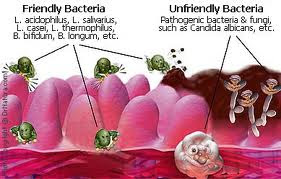Probiotics, Prebiotics... ring a bell? Anyone? No one? Bueller? Bueller? Most people don't know what they are or the difference between the two. There's been a lot of buzz lately as everyone seems to be taking these supplements without fully understanding the reasoning behind them. They just know that the dreadlocked woman working in the vitamin section of Whole Foods said they're "good for you." Sorry to break it to you, but Moon Fire the Whole Foods employee is not a doctor or dietitian (if she were, she wouldn't be toiling away in a super market for 30K a year), so I wouldn't hold her as a reputable source. So, what are prebiotics and probiotics? Why should we take them?
 |
| Seems Legit |
 |
| Dysbiosis: When Good Bacteria is Outnumbered |
 |
| Food Sources of Probiotics |
 |
| Food Sources of Prebiotics |
Despite the increasing evidence for the use of pre/probiotics, there are some important points to remember. Firstly, our understanding of them is quite limited as to exactly how great of a margin of benefit they have- it might not be enough to make it worth taking them. Moreover, the methods by which many of these studies were conducted is faulty. The correct way to perform a study is a double blind randomized placebo controlled study in which one group of people is given a probiotic and another group is given a placebo to treat a condition, such as diarrhea, for a period of time, and then their recovery is recorded. Neither group knows whether they have the probiotic or the placebo. The person who is in charge of collecting results also has no knowledge of treatment in order to prevent bias and expectations from skewing the results. This painstaking method is not the norm for studies. It usually goes something like this: probiotics are doled out to a bunch of people and after a few months, they are asked how many times they had diarrhea. If this number is lower than the average instance of diarrhea in the U.S., then the probiotic is reported to alleviate diarrhea- simple as that.
It's also important to keep in mind that no probiotic is a magical cure all. Each bacteria strain treats one specific condition. So a certain probiotic can treat only one condition, not every ailment in your body- whether it be real or imaginary. Which brings me to my next point, do you even need to take pre/probiotics? Most of the people who take these supplements are already healthy, but then hear Gwenyth Paltrow talking about probiotics on E! to treat her "digestive conditions", and all of a sudden,
 |
| Try Flaritin! A Fake Treatment for Fake Conditions! |
Since the FDA doesn't control supplements, you should buy them from a reputable brand that a doctor or dietitian recommends. Please, for the love of all that's holy, DO NOT buy pre/probiotics from a spam email that advertises a top secret European supplement that the government doesn't want you to know about. It's just not true. At the very best, you'll get plain old sugar pills, but you could also get something seriously dangerous. There have been numerous cases of online supplements being tainted with lead or actual harmful bacteria.
People who are immune compromised, such as cancer patients, or those who have a surgically placed device should not take probiotics at all. These are live strains of bacteria and although they are "good" bacteria, serious infections can result in these cases.
I bet Moon Fire didn't mention all of this. That's because Moon Fire is an idiot, she's also probably stoned. Oh, and she's getting all her info from the companies that produce these supplements. These details are left out when trying to suck out billions of dollars from the public each year...it wouldn't help business.
Thanks so much for reading everyone.
Until next week,
Michelle Azizi



